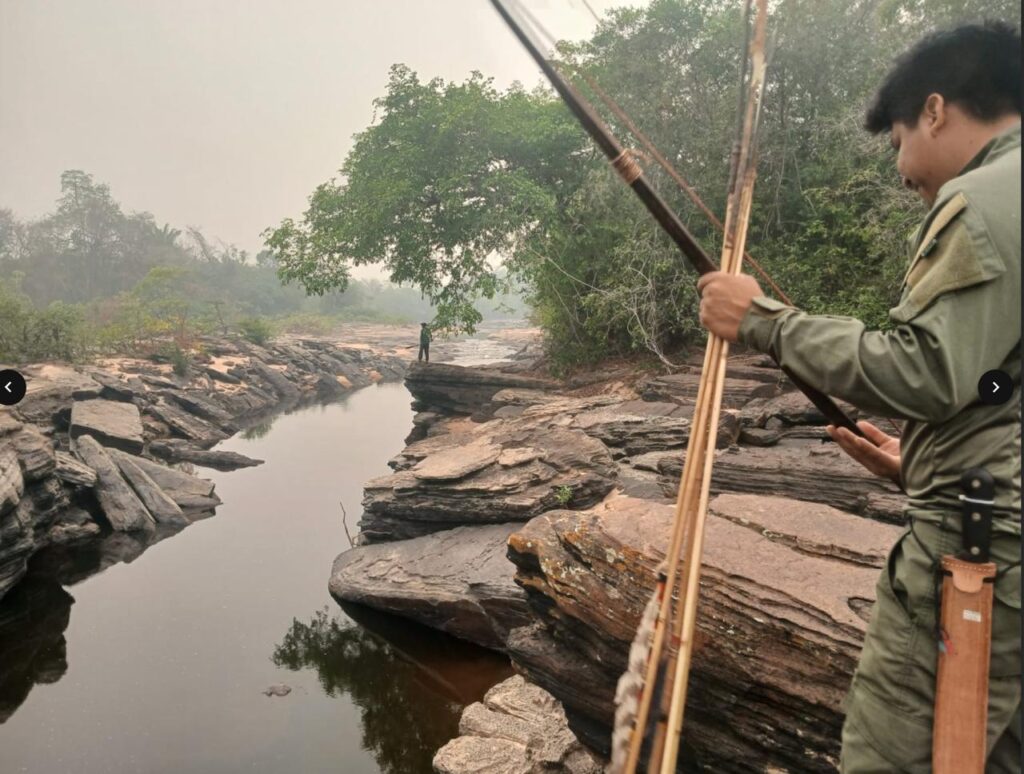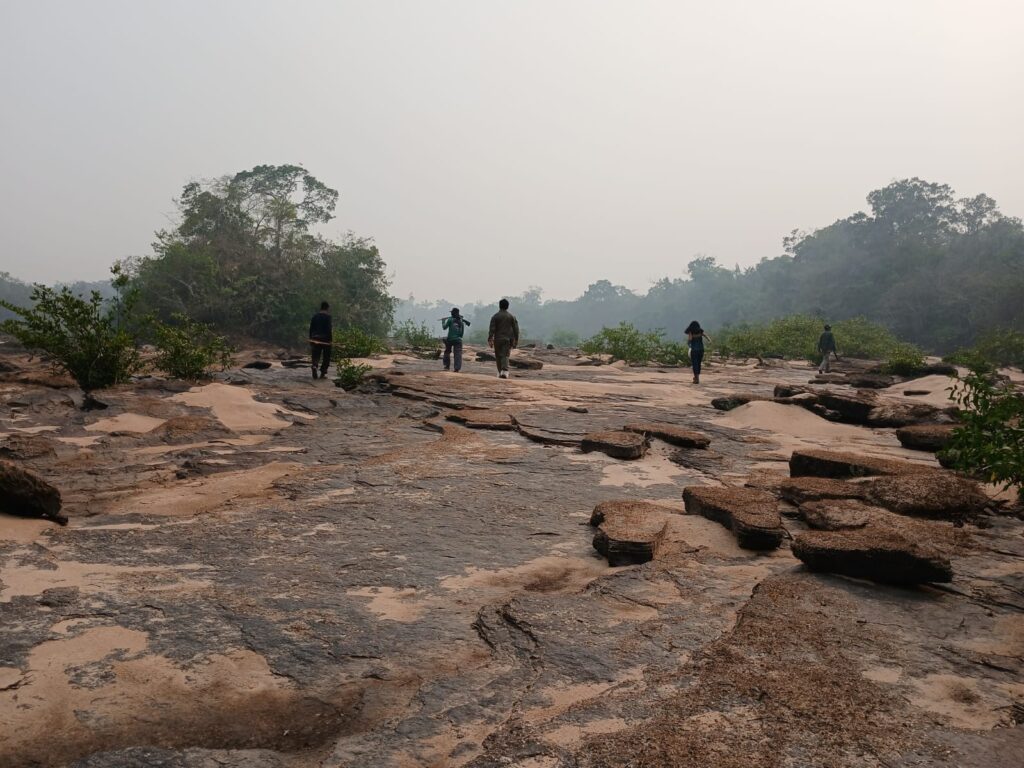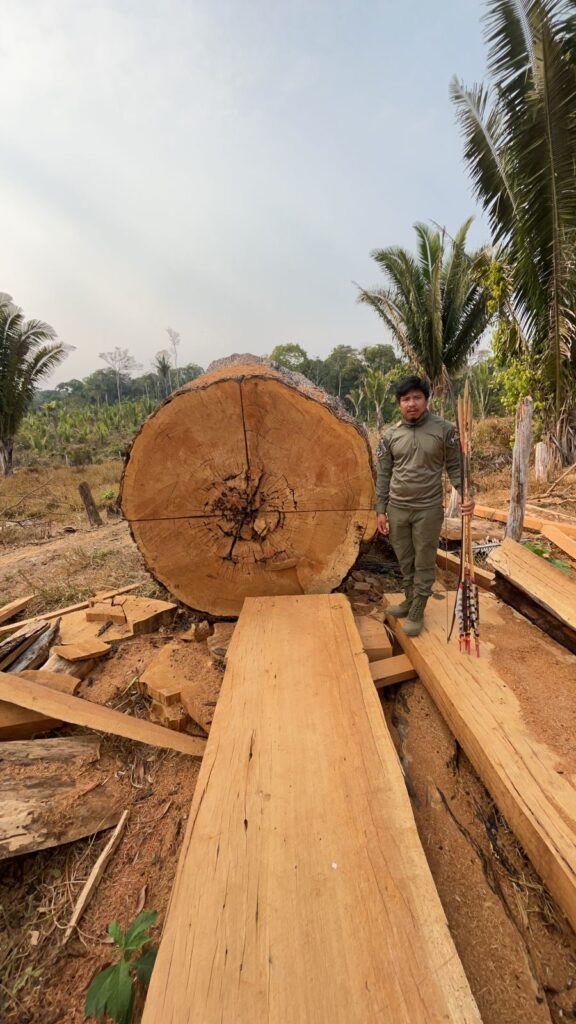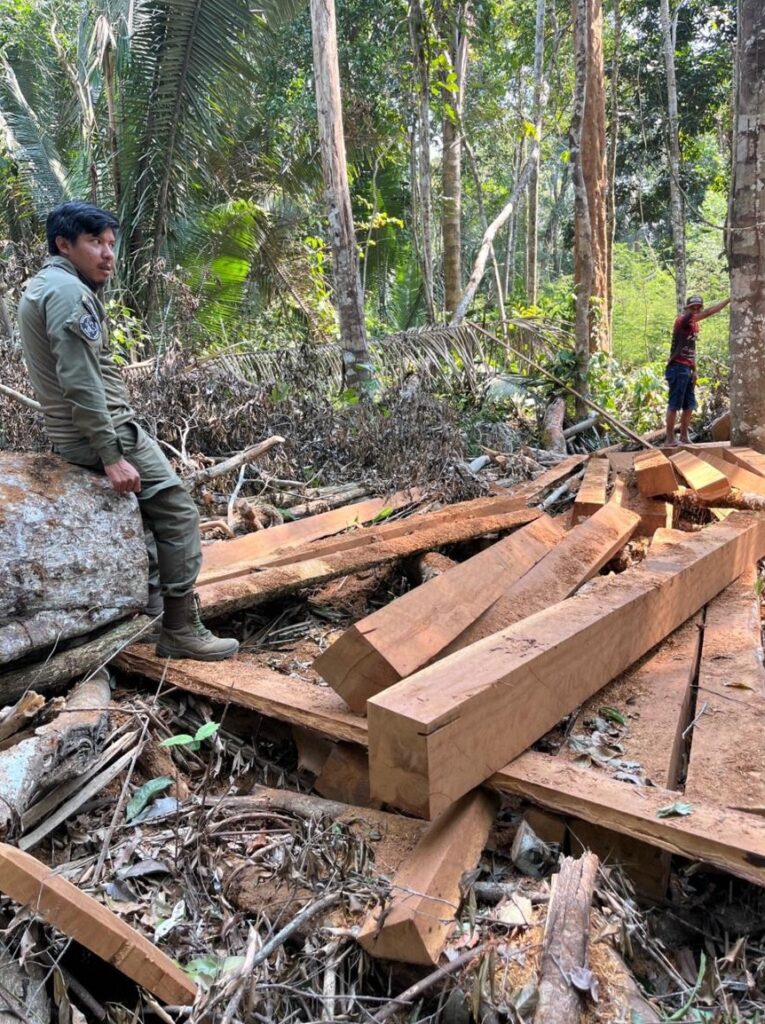Change through law
"I have never believed in the law as a mere instrument for maintaining the status quo. I see the law as a tool for emancipation and for combating social injustices.”
Carol Santana, Legal Director, AmazoniAlerta.
About AmazoniAlerta
AmazoniAlerta is a groundbreaking, Brazil-based NGO. Our mission is to radically increase the legal capabilities of Indigenous communities and organisations in the Amazon to support their use of Indigenous rights law to advance their rights and defend their ancestral lands and the rainforest from illegal invasion and deforestation.
Central to achieving this aim is systemically increasing Indigenous representation in the Brazilian and international legal systems and strengthening the practice of Indigenous rights law.
AmazoniAlerta is run by a team of Brazil’s leading Indigenous rights lawyers; Kari Guajajara, Carol Santana and Lucas Cravo.
It is globally recognised that Indigenous peoples, with their historically sustainable cultures, are the best guardians of their forests. Additionally a significant number (though not enough) of Indigenous lands in Brazil are ‘Terra Indígena’ (TI) meaning the indigenous people who have traditionally occupied them have exclusive right to their use and occupation, a right enshrined in the Brazilian Constitution that the state is obligated to uphold and protect.
Indigenous lands include over a quarter of the rainforest in Brazil. Over the last 30 years deforestation within them, accounts for just 1.6% of total forest loss in the country, in contrast to 68% for private land.
However many Indigenous territories are being decimated by myriad small-scale land grabs and infractions by illegal loggers, miners, poachers and farmers whose collective and cumulative actions are destroying the rainforest.
We invite you to support AmazoniAlerta and support the empowerment of traditional communities on the frontline of the struggle to preserve the world’s largest forest and its abundant biodiversity and socio-cultural wealth.
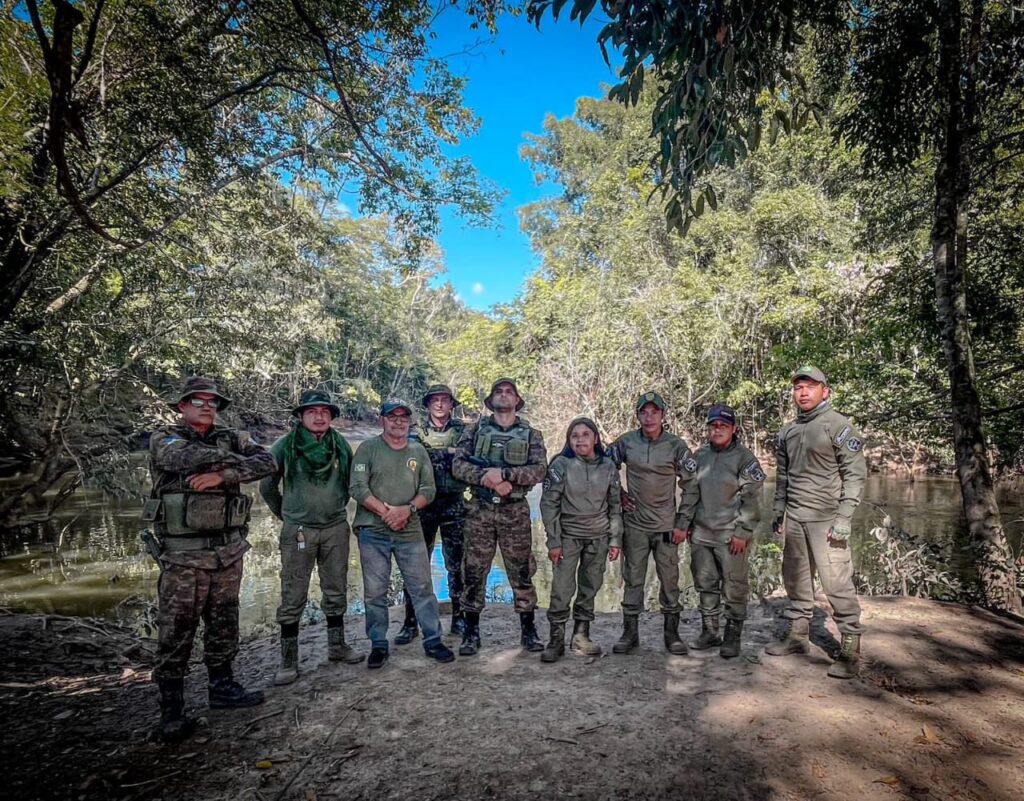
The Amondawa Team of Environmental Agents supported by AmazoniAlerta.
AmazoniAlerta’s three main strands of operations:
1. Legal education and professional training for Indigenous law students and Indigenous lawyers. We have two innovative programs to strengthen the practice of Indigenous rights law in Brazil. Firstly, we support Indigenous law students through bursaries and paid internships with our expert legal team. Secondly, The Indigenous Rights Clinic is an ongoing professional training program for Indigenous lawyers working on the frontline of Indigenous and territorial rights in the Brazilian Amazon. These are the only such programs currently operating in Brazil.
2. Legal and operational support for territorial monitoring of Indigenous lands. Our legal team collaborates with partner Environmental Agents Teams from traditional communities who patrol areas vulnerable to illegal invasion and deforestation and gather evidence of land, rights and environmental violations. Our legal team uses such evidence to engage with law enforcement and governmental authorities to catalyse the prevention and prosecution of illegal activity.
3. Supporting legal action and advocacy for Indigenous rights. Our legal team, often using evidence gathered by AmazoniAlerta’s partner Environmental Agents, supports the legal and advocacy actions of fellow Indigenous rights organisations at the national and international level.
1. Legal education for Indigenous law students and professional training for Indigenous lawyers.
Levels of Indigenous representation in the Brazilian legal system are vanishingly small. In Brazil, which has the highest number of lawyers per capita in the world, there are very few Indigenous law students (no figures), lawyers (likely in the low hundreds) and judges (under twenty). Additionally Indigenous rights law is not taught on any law degree syllabus and only on a few specialised courses and has not been systematised as a functional body of knowledge. Practitioners of Indigenous rights law must each learn, from scratch, ‘on the job’. Our Bursary & Internship Program for Indigenous Law Students and The Indigenous Rights Clinic are AmazoniAlerta’s initiatives to constructively address these issues.
Combined aims of the programs:
- To increase the number of legally qualified and highly trained, environmental and human rights defenders at the heart of Indigenous organizations and communities in Brazil.
- To systemically support the skills and knowledge base of the Indigenous rights legal community.
- To advance Indigenous representation and agency through Brazilian & international legal systems.
Bursary & Internship Program for Indigenous Law Students
Our program supports outstanding Indigenous law students who plan to focus their careers on Indigenous rights and environmental law. Bursaries cover the students’ law school fees and living costs. Alongside we provide Internships with our expert legal team provide a foundational grounding and ‘on the job’ experience in Indigenous rights law and environmental issues. We are currently successfully piloting the program with two outstanding Indigenous law students and are currently fundraising to significantly expand the program.

Our current Indigenous law students & interns, Jocivaldo Guajajara and Patrícia Juwi.
The Indigenous Rights Clinic
The Indigenous Rights Clinic is run by AmazoniAlerta’s legal team in partnership with the Legal Department of Coiab – Coordination of Indigenous Organizations of the Brazilian Amazon. Delivered via monthly, online webinars, the Indigenous Rights Law focused syllabus comprises real world case-studies, legal theory and historical context and is a platform for participating lawyers to improve their professional practice as advocates for Indigenous rights and environmental defenders. The initiative is also designed as a response to the significant unfulfilled demand for lawyers specialized in Indigenous Law from Indigenous rights organisations, NGOs and public institutions in Brazil
“Brazilian law schools do not teach Indigenous law as a subject and there are only a few, taught specialised courses available. In other words, this means that the discipline of Indigenous law is learnt through practice. Our program aims to support the skills and knowledge of practicing Indigenous rights lawyers.”
Lucas Cravo, Lawyer, AmazoniAlerta
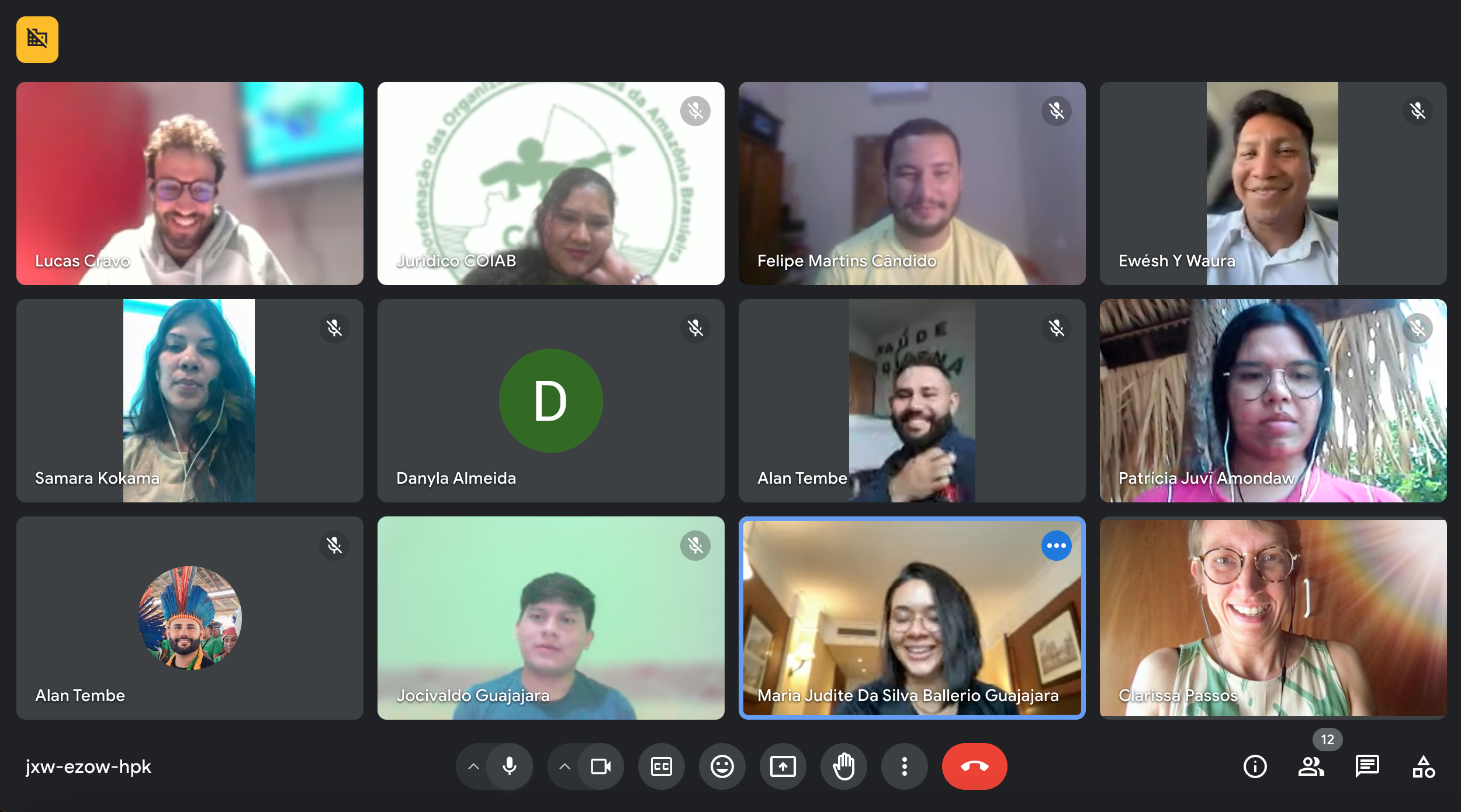
2. Legal and operational support for Territorial Monitoring of Indigenous territories
AmazoniAlerta is the first NGO to integrate the ‘guardian group’ model of territorial monitoring with a dedicated legal team. We aim to scale this approach into a cohesive network of guardian groups. Our legal team collaborates with partner Environmental Agents Teams from traditional communities who gather evidence of land, rights and environmental violations on their lands. Acting on evidence this evidence our in-house legal team of Indigenous and non-Indigenous lawyers engages with law enforcement, the judiciary and responsible government agencies within Brazil to catalyse the mitigation and prosecution of illegal activity. AmazoniAletra currently collaborates with two teams of Environmental Agents in the Brazilian Amazon:
Araribóia Indigenous Land, State of Maranhão: Our partner team in Araribóia is composed of members of the local Guajajara community. Araribóia Indigenous Land is in the north east of the Amazon. Home to the Guajajara People and the Awá People the territory is amongst the most invaded and vigorously defended indigenous lands in the Amazon. The State of Maranhão has lost a quarter of its primary rainforest since 2002, making the defence of still forested, Indigenous lands even more critical. In 2023 evidence from our Environmental Agents and legal team initiateda major law enforcement action against a large illegal logging operation in Araribóia. Over 80 government agents destroyed two illegal sawmills, seized chainsaws, machinery and firearms and arrested over 40 suspects.
Uru-Eu-Wau-Wau Indigenous Land, State of Rondônia: Our partner team operating in the Uru-Eu-Wau-Wau Indigenous land is formed by members of the Amondawa community. The territory lies in the state of Rondônia, in the south west of the Amazon and at the western limit of the so-called ‘Arc of Deforestation’ that describes the advancing front line of agricultural-led deforestation of the Amazon. The State of Rondônia has lost 24% of its primary rainforest in the last two decades.
Images below: Maps showing the Indigenous territories in which AmazoniAlerta’s partner Environmental Agents teams operate.
Evidence (with date and location redacted) gathered in by our partner agents in Araribóia Indigenous Land and Uru-Eu-Wau-Wau Indigenous Land, of illegal logging, illegal land appropriation for raising cattle and other infractions.




Images taken during the recent law enforcement action against an illegal logging operation in Araribóia Indigenous Land that was initiated by evidence gathered and lobbying by local AmazoniAlerta Environmental Agents. Illegal saw mills and machinery was destroyed in the operation and timber seized.
3. Supporting legal action and advocacy for Indigenous rights.
National: Our legal team is a supporting the legal team of COIAB (the Coordination of Indigenous Organizations of the Brazilian Amazon) who are currently engaged in two, ongoing legal processes before the Federal Supreme Court of Brazil – ADPF 709 and ADPF 991. ADPFs are legal actions that aim to protect fundamental rights and principles articulated in the Brazilian Constitution from contrary acts, policies or law. These structured strategic litigation processes can have multiple repercussions in terms of improving public policies and achieving the objectives of the actors. For civil society they are legal tools to hold the state to its constitutional obligations.
ADPF 709. The case was instigated by APIB – Articulation of Indigenous Peoples of Brazil to protect the health of Indigenous communities and their territorial integrity during the Covid-19 pandemic. However, since the core issue of the state’s failure to adequately protect the integrity of Indigenous lands is persistent, the process has continued with a shift in focus to the protection of isolated indigenous peoples and the removal of invaders. Images and information from AmazoniAlerta’s Environmental Agents in Arariboia Indigenous Land, home to the Awá Guajá an isolated Indigenous people has help inform Justice Luís Roberto Barroso, the rapporteur of ADPF 709 in his ordering of judicial measures to strengthening actions to remove invaders, mainly illegal logger, from the territory.
ADPF 991 was started in 2020 with AmazoniAlerta becoming an active partner in 2023. The action was initiated by APIB to seek a strengthening of measures to protect isolated and recently contacted indigenous peoples, shortly after the murders of Brazilian indigenist Bruno Pereira and British journalist Dom Phillips in the region of Atalaia do Norte, which borders the Vale do Javari Indigenous Land. This region is home to the largest number of isolated peoples in the world. The lawsuit aimed to demonstrate the widespread dismantling of policies to protect isolated peoples by the Bolsonaro government, which contributed, for example, to the killing of Pereira and Phillips by illegal fishermen. AmazoniAlerta is contributing evidence gathered by our Environmental Agents on the environment of violence and threat experienced in Arariboia Indigenous Land, home to the Awá Guajá isolated Indigenous people.
International: In the arena of international human rights law AmazoniAlerta is supporting COAPIMA, the Indigenous rights organisation of the Indigenous peoples of Maranhão, in its case before the Inter American Commission on Human Rights (IACHR) requiring the Brazilian Government to fulfil its legal obligation to protect Guajajara and peoples living in the Araribóia Indigenous Land. The IACHR has issued a Precautionary Measure no 754-20 requiring the Brazilian state to fulfil its duty of care. The process is ongoing.
Additional Activites
Supporting the rights of isolated Indigenous peoples: AmazoniAlerta is committed to supporting the cause of isolated Indigenous peoples, who chose live in their traditional ways with little or no contact with our wider society. As part of their program of territorial monitoring our teams of Environmental Agents chose to patrol areas where isolated people are known to live, aiming to contribute to their protection and the preservation of their isolated state. The work of our Environmental Agents in the Uru-Eu-Wau-Wau Indigenous land is conducted in collaboration with the Observatory for the Human Rights of Isolated and Recently Contacted Peoples (OPI).
Indigenous Women’s Rights: AmazoniAlerta supports Indigenous Women’s Rights. AmazoniAlerta contributes to a program of workshops and publications for Indigenous women on human rights, domestic violence and business initiatives. A number of team members have significant roles in the annual Indigenous Women’s March that takes place in annually in September in Brasilia.
Our Directors Carol Santana and Kari Guajajara conducting outreach and workshops on Indigenous Women’s Rights.


















